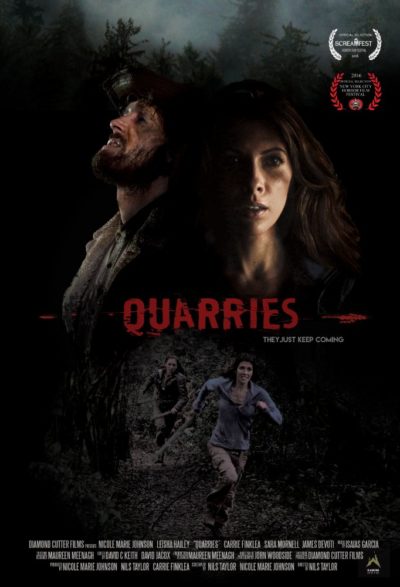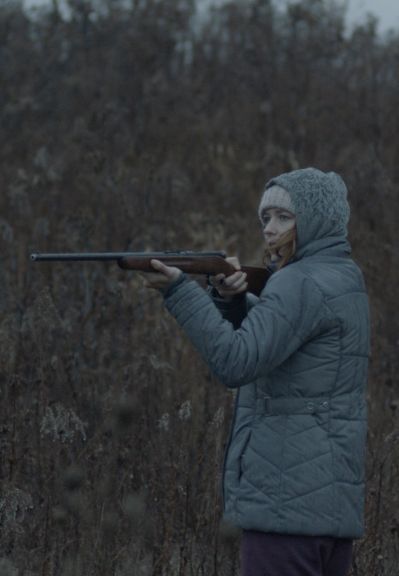★★½
“Questionable quarrels.”
 It’s not often a film manages to be under-written AND over-written. Yet this tale of wilderness survival does both. A group of women are out on what’s supposed to be an empowering hike through the forest, designed to boost self-reliance, esteem and all that good stuff. But they come under attack from a group of local men, apparently intent on a hunting expedition, with the woman as the prey. They’ll need to learn survival skills, that’s for sure.
It’s not often a film manages to be under-written AND over-written. Yet this tale of wilderness survival does both. A group of women are out on what’s supposed to be an empowering hike through the forest, designed to boost self-reliance, esteem and all that good stuff. But they come under attack from a group of local men, apparently intent on a hunting expedition, with the woman as the prey. They’ll need to learn survival skills, that’s for sure.
There’s a not-so-subtle message of gender politics here. The males here are all utter bastards or completely ineffective. Heroine Kat (Johnson, who also co-wrote the script with the director) is there to get away from an abusive relationship. It’s brick-like in its obviousness, yet it’s almost half-way before the two sides face off. Until that point, it’s virtually a poster-child for demonstrating why one of the rules of cinema is “show, don’t tell”. This does far too much telling, and to negligible effect. Maybe there are just too many members in the party, to allow for decent fleshing out? Beyond Kat, none of them are given any depth, defined by one or two simple characteristics. And I note the film’s fondness for liberal gender politics doesn’t extend to issues of race, perpetuating one of the most common genre stereotypes [minor spoiler at the link].
After an immensely annoying first half, things become somewhat better, when the film climbs off its soapbox, and gets down to the raw meat of rednecks vs. disgruntled women. However, we’re never given anything approaching an explanation for the huntsmen. There’s some vague hints in the intro about this being a former mining area, and one of the participants has a nasty burn on the side of his face. Quite how this ties into creating a pastime inspired by The Most Dangerous Game, is never clear. Given all the screen time (ineffectually) put into the victims’ back stories, you feel they could have spared two minutes and given a coherent motive to the other side.
The women handle themselves surprisingly well in the battle, making good use of the environment – which, basically, means clobbering the men with branches, rocks, and anything else the environment can provide them. Possibly a bit too good, given the absence of anything to explain why they can go toe-to-toe with opponents who are generally bigger, better armed and have the advantage of home territory. Yet these heroines seem curiously averse to taking weapons off those who are attacking them: I’d be looting the bodies and powering up with anything I could find.
The closest parallel I can provide in overall tone, might be to think of this as like an above-ground version of The Descent. Yet it’s not as entertaining or well put together: there, the lack of any real explanation for the cave-dwelling creatures didn’t pose any issue – because monsters. But when you introduce a human element, there generally needs to be at least some kind of motivation provided, or it just seems like lazy film-making. Despite some decent performances – not least from Johnson – it falls flat and forgettable. On the evidence here, she’s a better actress than a scriptwriter.
Dir: Nils Taylor
Star: Nicole Marie Johnson, Leisha Hailey, Carrie Finklea, James Devoti






 When I told Chris the title of this one, I swear you could hear her eyes rolling at the mere thought of it. But by the end, even she had to admit to having been won over by its dark charms. Most obviously is the sense of black humour which isn’t just dry, it’s as arid as the Atacama Desert. Morgan (Jungermann) and Jean (Carr) are fascinated by female serial killers, running a podcast on the topic which has acquired its own, unique fanbase. Morgan falls for Simone (Vand), a colleague at the food co-operative where she works. But Jean – who is also Morgan’s ex – can’t help thinking there is something seriously off with Simone.
When I told Chris the title of this one, I swear you could hear her eyes rolling at the mere thought of it. But by the end, even she had to admit to having been won over by its dark charms. Most obviously is the sense of black humour which isn’t just dry, it’s as arid as the Atacama Desert. Morgan (Jungermann) and Jean (Carr) are fascinated by female serial killers, running a podcast on the topic which has acquired its own, unique fanbase. Morgan falls for Simone (Vand), a colleague at the food co-operative where she works. But Jean – who is also Morgan’s ex – can’t help thinking there is something seriously off with Simone. Actually, if only this
Actually, if only this  A viral plague has decimated mankind, turning its victims in mindless, flesh-craving ghouls. One of the few to have survived is Ann (Walters), who has taken up residence in the woods, where she has camped out. Ann uses the survival skills she received from her now-absent husband, Jason (West), only occasionally having to emerge and risk the threat of the infected, in order to gather supplies. Her secluded, yet relatively safe existence is disturbed, when she finds an injured man, Chris (Thompson) and his teenage daughter, Liv (Piersanti) on a road. They are supposed to be on their way north, to where the epidemic is reported to be in check. Yet Chris, in particular, seems curiously unwilling to be on his way.
A viral plague has decimated mankind, turning its victims in mindless, flesh-craving ghouls. One of the few to have survived is Ann (Walters), who has taken up residence in the woods, where she has camped out. Ann uses the survival skills she received from her now-absent husband, Jason (West), only occasionally having to emerge and risk the threat of the infected, in order to gather supplies. Her secluded, yet relatively safe existence is disturbed, when she finds an injured man, Chris (Thompson) and his teenage daughter, Liv (Piersanti) on a road. They are supposed to be on their way north, to where the epidemic is reported to be in check. Yet Chris, in particular, seems curiously unwilling to be on his way. After breaking up with her boyfriend, Gloria (Hathaway) holes up in her middle-American hometown. She gets a job in a bar, run by her childhood pal, Oscar (Sudeikis) – not that this employment does much for Gloria’s burgeoning alcoholism. Meanwhile, over in Korea, the city of Seoul is being plagued by a giant monster, which will appear out of nowhere, behave oddly, and then vanish again. Gloria eventually figures out that when she goes through a particular spot – a local children’s playground – at a specific time, the creature appears in Korea, and its actions reflect hers. Turns out Oscar can do the same, manifesting in Seoul as a giant robot, and he may not be as benign with his new-found powers, as Gloria is attempting to be.
After breaking up with her boyfriend, Gloria (Hathaway) holes up in her middle-American hometown. She gets a job in a bar, run by her childhood pal, Oscar (Sudeikis) – not that this employment does much for Gloria’s burgeoning alcoholism. Meanwhile, over in Korea, the city of Seoul is being plagued by a giant monster, which will appear out of nowhere, behave oddly, and then vanish again. Gloria eventually figures out that when she goes through a particular spot – a local children’s playground – at a specific time, the creature appears in Korea, and its actions reflect hers. Turns out Oscar can do the same, manifesting in Seoul as a giant robot, and he may not be as benign with his new-found powers, as Gloria is attempting to be. That would have been a more appealing title. Although the incredibly generic one here reflects the incredibly generic plot, which sinks this, despite the efforts of a well above-average cast. CIA agent Alice Racine (Rapace) has, at her own request, been assigned to the backwater of an East London community, after blaming herself for failing to stop a bombing in Paris. She’s called out of her semi-retirement to interrogate a terrorist courier, believed to be carrying a message about an imminent biological attack on a US target in London. She cracks the subject and hands over most of the intel, only to discover the recipients are not the agency employees they claimed to be, and will kill her as soon as they get what they need. She goes on the run, unsure of who she can still trust: her mentor (Douglas), the MI-5 boss (Collette), or a burglar she encounters who happens to be a former British commando (Bloom). Can she stop the attack before it’s carried out?
That would have been a more appealing title. Although the incredibly generic one here reflects the incredibly generic plot, which sinks this, despite the efforts of a well above-average cast. CIA agent Alice Racine (Rapace) has, at her own request, been assigned to the backwater of an East London community, after blaming herself for failing to stop a bombing in Paris. She’s called out of her semi-retirement to interrogate a terrorist courier, believed to be carrying a message about an imminent biological attack on a US target in London. She cracks the subject and hands over most of the intel, only to discover the recipients are not the agency employees they claimed to be, and will kill her as soon as they get what they need. She goes on the run, unsure of who she can still trust: her mentor (Douglas), the MI-5 boss (Collette), or a burglar she encounters who happens to be a former British commando (Bloom). Can she stop the attack before it’s carried out? A mission in central America against drug cartel boss Reynaldo Benitez (Garza) goes wrong, leaving eight Special Ops soldiers dead. This includes the husband of Naval Covert Operations Command agent, Abbey Vaughn (Gregory), who is intent on discovering the truth about what happened to her spouse. She links up with the only survivor of the operation, Lt. Sam Harrigan (Scarbrough), now living in a trailer, and spending his time drinking and practicing golf. Together with the rest of their team, they investigate the case, only to find the tentacles of organized crime are deeper embedded than they appear, and their inquiries put not only themselves, but Abbey’s family in serious danger.
A mission in central America against drug cartel boss Reynaldo Benitez (Garza) goes wrong, leaving eight Special Ops soldiers dead. This includes the husband of Naval Covert Operations Command agent, Abbey Vaughn (Gregory), who is intent on discovering the truth about what happened to her spouse. She links up with the only survivor of the operation, Lt. Sam Harrigan (Scarbrough), now living in a trailer, and spending his time drinking and practicing golf. Together with the rest of their team, they investigate the case, only to find the tentacles of organized crime are deeper embedded than they appear, and their inquiries put not only themselves, but Abbey’s family in serious danger.
 I say the above, since the father of the star here is Clint Eastwood, possibly the most famous vigilante in cinematic history. He gave us Dirty Harry, who memorably spat out lines such as, “When an adult male is chasing a female with intent to commit rape, I shoot the bastard – that’s my policy.” This apple doesn’t fall far from the tree. Though Noelle, the art student who becomes an avenging force after being raped at a party by a fellow student, takes a little longer to get to that point of unrepentant street justice. Her first victim is purely accidental, her attacker falling over a balcony after she confronts him, in the hope of getting some kind of apology. Doesn’t happen, and his death doesn’t exactly cause her sorrow. When she realizes she is also far from alone in what she has gone through, she decides that active retaliation is the best approach.
I say the above, since the father of the star here is Clint Eastwood, possibly the most famous vigilante in cinematic history. He gave us Dirty Harry, who memorably spat out lines such as, “When an adult male is chasing a female with intent to commit rape, I shoot the bastard – that’s my policy.” This apple doesn’t fall far from the tree. Though Noelle, the art student who becomes an avenging force after being raped at a party by a fellow student, takes a little longer to get to that point of unrepentant street justice. Her first victim is purely accidental, her attacker falling over a balcony after she confronts him, in the hope of getting some kind of apology. Doesn’t happen, and his death doesn’t exactly cause her sorrow. When she realizes she is also far from alone in what she has gone through, she decides that active retaliation is the best approach. This sequel is almost entirely unrelated to the original, beginning with a new, fresh character who will be tortured within an inch of her life, before escaping and roaring back for revenge. However, it manages to be a little more coherent, even as it replaces the redneckophobia of the original, with much more straightforward xenophobia.
This sequel is almost entirely unrelated to the original, beginning with a new, fresh character who will be tortured within an inch of her life, before escaping and roaring back for revenge. However, it manages to be a little more coherent, even as it replaces the redneckophobia of the original, with much more straightforward xenophobia.